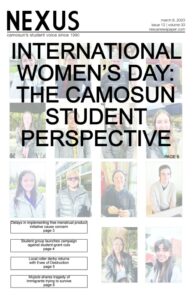This year’s International Women’s Day’s theme is “embrace equity,” which is important to reflect on and strive for. And while there’s a broader societal importance to International Women’s Day, there’s also a personal significance to it for me.
The personal side of it starts with the women in my family and branches out from there. International Women’s Day has been recognized in my home more than Mother’s Day. It started when my son was eight years old and I downloaded a calendar app to see which foods are celebrated on which days (almost every day has a food). The calendar also has every other holiday and day of recognition on it; my son decided to make me a card for International Women’s Day knowing that I’m not a huge fan of Mother’s Day.
Who I am and what I do extends far beyond being a mother. A joke among homeschool moms is we are the teacher, principal, janitor, and cafeteria worker. I can add being a student and features writer to that list, and I’m also a certified yoga teacher, to throw some randomness into the mix; the list goes on.
Every year, what strikes me most is how vastly different my life is from my mom’s and my oma’s. I’m a second-generation Canadian. My mom was the first in our family to be born in Canada. In my generation of the family, I’m the second one to be born in Canada; my brother is the first.

When I was six or seven years old I asked my oma what she dreamed of being when she was a little girl. She looked at me bewildered; she couldn’t understand what I was asking her. Despite coming to Canada after WWII her destiny was to become a wife and mother; there was no other choice for her. I was an adult when I was told my oma’s family fled Poland when she was a girl and hid in a farmhouse in Germany before coming to Canada.
My mother has strength, determination, and perseverance like no one else I know. For the sake of me and my brother, she kept our family together until I was 21. She worked full-time despite significant health issues, clawing her way up the corporate ladder to her current position. Not to mention she had a headstrong, activist teenage daughter who liked to push the limits of all rules. (From the time I was six months old, I’ve had health issues; I’m also accident prone. “Challenging” should’ve been my middle name.)
There were times when my mom terrified me, but as an adult, I get it. The typical strict German mom lives in me too. Not as much as my oma or mom but we take the lessons from previous generations and make our own way. In my mom’s generation, three out of five children are women; in my generation, seven out of nine are women. The major theme growing up was always that women need to be able to stand on their own two feet; we didn’t get into equality or feminism, just the need to be independent.
International Women’s Day is a day to reflect on the independence women have in Canada that other women in the world might not have. I have the freedom to wear what I want, drive a car, live on my own, raise my child the way I want to, and go to school. These are things that women around the world don’t necessarily have that we take for granted.
When talking to our contributing writer Ezra Kiedaisch about the difference between equity and equality she had a good explanation: she said equality is everyone being in the same place but equity is everyone being given the tools they need to reach that place. Look around campus and you’ll see people from different backgrounds and countries, but not everyone has been given the opportunity we have. Some people will never be able to get a post-secondary education.
The embrace equity theme is about gender equity, for all genders. In my mind, that means levelling the playing field no matter what a person’s socioeconomic background is, what their race is, or who their parents might be. Everyone gets what they need to succeed in life, to be what they want to be.
We’re living in turbulent times: drag-queen storytimes are being protested and the LGBTQ community is being targeted with ’80s-era hate. Transgender women and men are being threatened for simply existing. What does an equitable life look like to them? There’s so much more at stake for some people than equality in a patriarchal society. Some people’s picture of an equitable life is just walking down the street safely; that’s a very sobering thought.
We don’t have gender equity in Canada, let alone the entire world. So this year, I want to reflect on what it would take to achieve gender equity. Where do we start? What tools do we need? We have a number of women in history as examples of how to affect change. What lessons can we learn from them?
Since 1911, when International Women’s Day first started, there have been significant advancements in women’s rights, but the answers to these questions tell me that we have a long way to go.
Pick up our March 8 print issue (or read it online here) to read what International Women’s Day means to 14 other Camosun College students.
